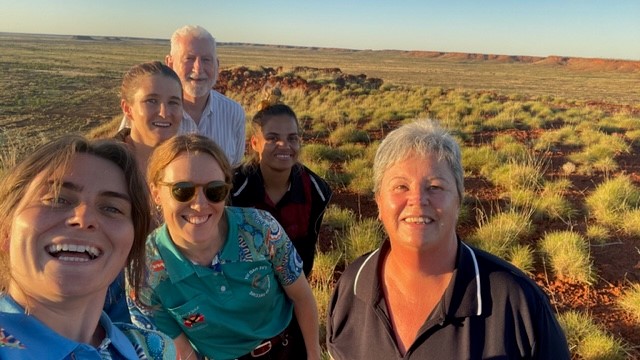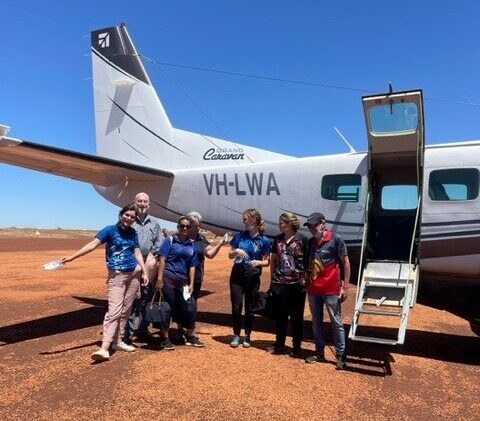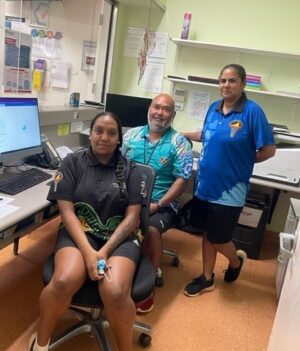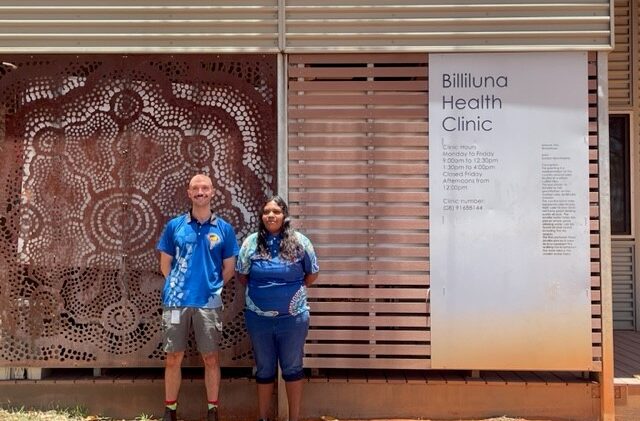Surveyors in Focus
Travel, nature and learning from the locals on a week-long accreditation adventure

With three decades of AGPAL Surveyor experience under their belts, Dr Tony Atkins and Mrs Jannine Gerke undertook a week-long adventure to assess the five remote Western Australian community practices which form part of the Kimberley Aboriginal Medical Services (KAMS) Aboriginal Community Controlled Health Organisation (ACCHO)
Spanning 423,517 square kilometres, the Kimberley region is almost twice the size of Victoria and sits at the northern end of Western Australia, accounting for one-sixth of the state’s total land area. The population is spread across towns and remote communities, with more than 35,000 residents; delivering health care to the entire Kimberley region is certainly an undertaking. Tony and Jannine had the privilege of seeing firsthand how KAMS is able to accomplish this, citing the involvement of local community and delivery of culturally appropriate health care as key components to their success.

Tony, Jannine and KAMS Staff before their flight to the next clinic
Tony and Jannine have each undertaken numerous accreditation assessments of Aboriginal Medical Services throughout their combined three decades of experience as AGPAL Surveyors. They share an avid interest in Aboriginal healthcare and have substantial experience assessing rural and remote practices. Their journeys to becoming AGPAL Surveyors are quite similar; after preparing for accreditation within their own respective practices, Tony and Jannine realised how valuable the accreditation process is to ensuring safety and continuing quality improvement.
“I always enjoy the time spent in each practice learning their systems, practice culture and encouraging each practice to take a positive approach to change. […] Across the clinics it was great to see local community working in leadership, healthcare logistics and maintenance roles.” – Jannine
Jannine Gerke has been an AGPAL Co-Surveyor for two decades, first seeing the benefits of the structured guidelines provided by the RACGP Standards while preparing for accreditation within her own practice. The opportunity to ensure safe and high-quality patient environments while improving her quality improvement knowledge led Jannine to apply with AGPAL to become a co-surveyor in 2003. Since then she has been conducting regular assessments within all types of practices nationwide.
Dr Tony Atkins practices as a general practitioner (GP) within a university campus clinical team, providing primary care to patients while also contributing to the education of RACGP registrars and medical and nursing students. Joining the AGPAL team as a GP Surveyor approximately 10 years ago, Tony conducts on-site accreditation assessments for AGPAL several times a week, with a particular focus on supporting Aboriginal Medical Services seeking accreditation.
Their shared passion for supporting Aboriginal healthcare has allowed each of them to visit many communities across Australia, gaining insight into the different ways that each Aboriginal Medical Service provides healthcare to the local community’s unique requirements. Tony and Jannine’s recent assessment of KAMS provided them with yet another opportunity to see healthcare tailored to individual community needs.

KAMS Staff
KAMS is an Aboriginal Community Controlled Health Organisation (ACCHO) that has been providing healthcare since 1986, supporting and representing the interests of a network of eight ACCHOs across Kimberley while also engaging in regional advocacy, health promotion, training and research. Beyond their advocacy and education, KAMS provides comprehensive primary health care services to the remote communities of Beagle Bay, Bidyadanga, Balgo, Mulan and Billiluna. Each of these remote clinics is staffed by a team comprising of Aboriginal Health Workers and Practitioners, remote area nurses and a resident or visiting General Practitioner, with the coordination and support of KAMS’ Broome-based quality management team.
It was those five remote community clinics that Tony and Jannine had the pleasure of recently assessing against the RACGP Standards for general practices 5th edition to ensure KAMS provides safe, high-quality healthcare. The full assessment was conducted over the course of five days, with the surveyors visiting a different remote area each day; this enabled them to see how the community requirements differ in each area and also reflected the various ways each practice is run. Logistics were coordinated in partnership between the KAMS Team and Tony and Jannine in the two weeks leading up to their arrival. There were many travel factors to consider due to the vast distance between each remote practice. The correspondence prior to their on-site assessment provided Tony and Jannine with an insight into communication techniques within the KAMS practices, evidencing how involved the clinics, staff and local communities are in regular, open discussion about their health care services and community needs.

KAMS Staff outside Billiluna Health Clinic
Tony and Jannine both expressed that they were impressed with KAMS and the services they offer, as well as their enjoyment of the five days spent assessing the ACHHO clinics.
The AGPAL Team were fortunate enough to catch up with both Tony and Jannine to get further insight into this memorable assessment experience, and their thoughts on undertaking AGPAL accreditation assessments. Read the full interview below.
_______________
How long have you been an AGPAL Surveyor and what attracted you to do so? Can you tell us what you enjoy most about being an AGPAL Surveyor?
Tony: I am a GP privileged to practice as part of a clinical team on a university campus in Melbourne, where we are heavily engaged in teaching primary care to medical and nursing students and RACGP registrars. About 10 years ago, after completing the training, I joined the AGPAL Team as a GP Surveyor. Several times a week, accompanied by a practice manager or practice nurse co-surveyor, I undertake on-site accreditation assessments at a range of practices which may be suburban, regional, country or remote. I look for every opportunity to support Aboriginal health services seeking accreditation.
I have a special interest in Aboriginal health, which is how I first met the accreditation process. I was Senior Medical Officer of an Aboriginal Medical Service in the Top End, and was called on to lead our service through its first accreditation. At that time I knew little of RACGP Standards, and had no experience of the accreditation process. With much effort by our team we managed to secure our first accreditation. This experience convinced me how instrumental the accreditation process can be in enabling us to focus on continuing quality improvement.
My co-surveyor for the Kimberley surveys, Jannine, likewise has a strong professional interest in Aboriginal health and experience in surveying rural and remote clinics.
Jannine: I have been an AGPAL Surveyor for about 19 years. Working as a manager in general practice I found preparing for accreditation provided an opportunity for our practice team to understand how understanding guidelines, regular review and continuous quality improvement helped our practice to provide a positive environment with quality outcomes for patients.
When I became involved with preparing accreditation in my practice, I realised the benefits of having criteria to guide us in our journey in using quality improvement to develop sound business and healthcare systems. Over time I looked for ways to improve my skills and share my knowledge in quality improvement. With suggestion and encouragement of fellow practice managers I applied to become an AGPAL Surveyor.
I always enjoy the time spent in each practice learning their systems, practice culture and encouraging each practice to take a positive approach to change.
Can you tell us about the recent assessment you undertook for KAMS?
Tony: The remote Aboriginal Medical Services assessed recently are each staffed by a team comprising Aboriginal Health Workers/Practitioners, remote area nurses and a resident or visiting GP, all supported by a Broome-based quality management team. An absolute highlight in this assessment experience with these clinics was to witness firsthand the professionalism, enthusiasm and motivation of this quality management team. Their role included recruitment, induction training of all new personnel, the conduct of (often online) clinical team meetings and CPD activities, logistics, pharmacy and business management support. Their continuing refinement of best-practice protocols for many common conditions, has provided a resource valued throughout Australia.
Being remote services, what stood out to you in regards to the way that KAMS support their patients/local community?
Jannine: It was a pleasure to work with the KAMS Team on such a large and multi-site assessment. In the two weeks leading up to the accreditation assessment many members of the KAMS Team spent time communicating with me to provide an expansive overview of the structure and the role of KAMS and the clinics that were undergoing accreditation. This helped me to understand how the organisation worked to develop policies and procedures that would cover a number of clinics in different remote areas while allowing flexibility for the differences in community requirements and sizing and staffing in the clinics. It was clear that communication with the community and the staff in the clinics is open and regular.
It’s important to the organisation that local community members play a key role in providing primary health care to the community. Across the clinics it was great to see local community working in leadership, healthcare logistics and maintenance roles.
Having a combination of local members of the community and staff recruited from outside the area gives the team the ability to share knowledge and develop healthcare clinics that meet the needs of their patients.
Are you able to share any unique processes/systems/initiatives that KAMS undertake to overcome the challenges of being a remote service?
Jannine: KAMS strives to ensure that their local communities have a sense of ownership in their healthcare clinics and work with their community members to promote and encourage a career in healthcare.
KAMS provide excellent access to education and support for staff members across the whole organisation.
With your AGPAL Surveyor colleagues in mind, what are the most significant lessons you learnt from the experience?
Jannine: If you can spend time communicating with organisations, especially if there are multiple clinics, it will help with understanding the different roles and how the organisation works with each clinic.
Read any uploaded information early as there are always questions of how organisational policy relates to individual clinics.
No matter how carefully you plan, Mother Nature has her own ideas, which means even on a day trip to carry supplies in a backpack. You could be sleeping anywhere if the weather changes.
Or if you’re lucky like us you could drive back to Broome with a car full of fantastic locals, learning about seasonal hunting for Barramundi, Mangrove Jack, Oysters and Turtle; how to catch a buffalo and get it on your 4WD; or how to bake in the oven a Barney (goanna) – apparently Kikkoman soy sauce is a great flavouring. Still not quite sure how to get it in the oven whole 😊
Tony: Jannine and I quickly recognised that the effectiveness and validity of our assessment would require us to look to the expertise and local knowledge of the practice personnel and their quality management team, in order for us to appropriately evaluate against the RACGP Standards in their unique context. It quickly became evident to us that every person we interviewed shared our objective of promoting continuing quality improvement.
Based on your assessment experience, do you have any hints or tips to share with other Aboriginal Medical Services and general practices to assist them in running a safe and quality-focused practice and/or preparing for accreditation?
Jannine: Due to the remoteness and small size of many communities there can often be many contracted and locum staff employed to support the clinics.
Having a strong induction program and introduction to the community is very important.
My top tip for preparing for accreditation is to: Involve the whole team in continual learning, review and preparation of the standards.
Set a schedule for reviewing your practice against the current standards. Don’t leave your review until the last minute.
Tony: There is a lesson to be learnt by every general practice undertaking accreditation: working as a team we will be developing and documenting the ways most appropriate for our practice to meet and exceed the national standards set by our college.



